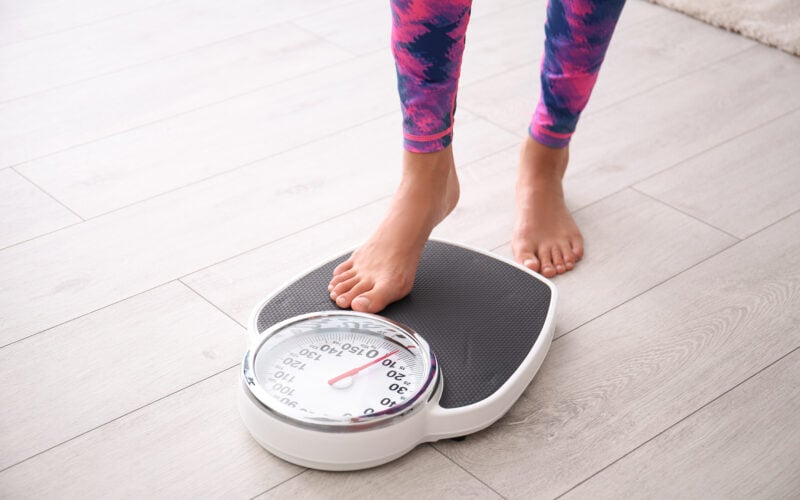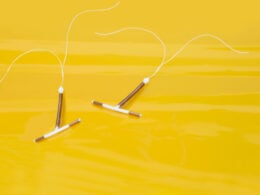Are you getting off birth control for the first time in a long while, and wondering how to lose weight you may have gained while you were on it? Natural Womanhood already tackled the thorny topic of whether birth control actually causes weight gain, exploring multiple plausible explanations for why so many women seem to pack on the pounds while on the Pill. But, as explained by NW Editor Grace Emily Stark, “the question ‘Does birth control cause weight gain?’ might be something of a red herring altogether. Because it might not be the birth control itself causing weight gain for some women—it might be the changes in eating patterns that birth control could be causing.” For instance, the synthetic progesterone (also called progestin) in hormonal birth control can actually increase your appetite.
So how can you regain a sense of your body’s natural cues post-Pill to help you lose weight and feel your best? Mindful eating, cycle syncing one’s diet and exercise, and prioritizing good nutrition, good sleep, and stress management are all good ways to get your body–and your weight–back on track after getting off the Pill.
Post-Pill weight loss requires regaining a sense of mindfulness when it comes to eating
Research increasingly supports the idea that self-awareness and mindfulness, whether in the form of mindful eating or in awareness of how we physically react to stressors so that we can consciously choose a healthy response, are integral to sustained weight loss. Through this lens, weight loss and maintenance of a healthy weight have more to do with lifestyle changes that can be sustained over time rather than riding the merry-go-round of fad dieting.
Unfortunately, contraception encourages the opposite of mindfulness about, or awareness of, how our bodies work (i.e., our body literacy), and that lack of awareness may make it harder to lose weight. How? Let’s face it. Contraceptive use doesn’t exactly set us up to be in tune with and mindful of our bodily cues, whether they’re for hunger or something else. After all, birth control is intended to override our cyclical patterns of fertility and infertility, normally indicated by varying cues depending on where we are in our cycle. Long-acting reversible contraceptives (LARCs) particularly encourage a set-it-and-forget-it, autopilot mentality when it comes to our bodies.
So how can you be mindful of your appetite and eating patterns now that neither are no longer influenced by the synthetic hormones found in birth control? At its simplest, according to Harvard Health, mindful eating involves “noticing the colors, smells, flavors, and textures of your food; chewing slowly; getting rid of distractions like TV or reading; and learning to cope with guilt and anxiety about food.” Mindful eating lends itself to eating less because we tend to realize sooner than we otherwise would that we are full. Eating mindfully also means asking ourselves the question “Am I eating because I’m hungry, or for some other reason?”
Consider cycle syncing when it comes to eating and exercise for sustainable post-Pill weight loss
Perhaps one of the most important things women can do to successfully lose weight and keep the extra pounds off is to sync diet and exercise with their menstrual cycles. As Natural Womanhood’s Hanna Cox explained, “Cycle syncing is the practice of eating, exercising, and aligning your schedule with the different phases of your natural menstrual cycle. That way, you give your body the support and rest it needs, rather than pushing it to perform at the same high level at all times.”
Cycle syncing and eating patterns
Recognizing that your nutritional and metabolic needs vary over the course of your cycle is a game-changer! In her book This is Your Brain on Birth Control, evolutionary psychologist Sarah E. Hill points out that women tend to eat less before ovulation (during the follicular phase), and more after ovulation (during the luteal phase). When you understand what’s happening during those phases of your cycle, this pattern makes sense. During the follicular phase, your body is gearing up to ovulate, and so there is an evolutionary, biological tradeoff that occurs in the form of a smaller appetite. Conversely, during the luteal phase, your body is gearing up to possibly gestate a baby for the next several months (in the event your newly-released egg gets fertilized), so it’s in “We must eat all the things” mode. (As it happens, this is why hormonal birth control may have made you gain weight; it put your body into a constant, synthetically-induced version of the luteal phase. More on that, here.)
You can see how, in practice, knowing where you are in your cycle can help you identify when you may be more likely to overeat or stress eat–and how you can use this to your advantage! For example, if you’re trying to cut back on portions, know that it might naturally be easier in the follicular phase than in the luteal phase–and to give your body what it needs if you find yourself feeling hungrier during the luteal phase (and focus especially on feeding it nutritionally-dense foods during this time, that will keep you feeling fuller for longer!).
Cycle syncing and exercise
Perhaps the first simplest principle of exercise for weight loss is to increase your activity level, and the second simplest principle is to change up the type of exercise you’re doing to keep from plateauing. Similarly, syncing what kinds of workouts you do during each phase can also help you “hack” post-Pill weight loss.
In her book In the Flo, reviewed here, women’s hormone expert Alissa Vitti gets into the nitty-gritty of tailoring what to eat and how to exercise based on which phase of your cycle you’re in, so that you can work with, rather than against, the natural patterns in your body, i.e. “working smarter not harder.”
For example, you’ll want to give your body time to rest during your period and in the days leading up to your period, while mid-cycle is the time to kick things into high-gear, when you’re naturally feeling more energetic; consider gentle exercise like yoga during the former, and more high-intensity exercises like HIIT and cardio (running, swimming, biking) during that latter. No matter what workouts sync to your cycle each day, a general rule of thumb is to aim for 30 minutes of moderate exercise or 15 minutes of intense exercise each day, according to Harvard Health.
Don’t forget to prioritize good nutrition, good sleep, and stress management when trying to lose weight after getting off the Pill
Nutrition
Some principles to keep in mind regarding nutrition, both for losing weight and maintaining that weight loss, include portion control, drinking more water and avoiding sugary drinks, and swapping out high-calorie/low-nutrition items (like sweet treats, simple carbs, and salty snacks) for more nutritionally-dense whole foods (like fruits, vegetables, nuts, eggs, unprocessed meats, complex carbs, and full-fat dairy items). When getting off the Pill, you’ll also want to be especially mindful of your body’s Pill-induced nutritional deficiencies, and be sure to supplement the vitamins and minerals your birth control depleted.
Sleep
This may come as a surprise, but when and how much you sleep really matters for weight loss and maintaining a healthy weight! Back when I worked night-shift, I often slept just four hours between shifts. I found myself often resorting to eating more since I was sleeping less, and I wasn’t the only one. The phenomena of nurses gaining 10-15 pounds after starting nightshift was common knowledge on my unit in the hospital, and research backs up our experience.
In this study, sleeping less correlated with increased levels of ghrelin, the hunger hormone, and higher likelihood of being overweight or obese. This study found that just two consecutive nights of sleeping four hours or less led to increased levels of ghrelin and decreased levels of leptin, the fullness hormone. Fascinatingly, this study of adult men and women suggests a “sweet spot” of 7-8 hours sleep at night, versus 6 or less, or 9 hours or more for adults. And this study of overweight or obese women found that women who reported 7 hours of sleep per night were 33% more likely to report weight loss over a 24 month period.
Stress
Most of us are unsurprised that increased stress levels tend to correlate with weight gain due to excessive eating, particularly sweets. We need only watch any chick-flick to observe this in practice, as the devastated dumped girlfriend character consumes massive amounts of ice cream or chocolate. And while the chick-flick character may be a little over the top, don’t we all do something similar when stressed, albeit usually on a smaller scale?
But we also intuitively understand the following quote from Austrian psychiatrist and concentration camp survivor Victor Frankl in his book Man’s Search for Meaning:
“Between stimulus and response, there is a space. And in that space there is a power to choose. And in that choice, there lies our growth and freedom.”
In my own experience, counseling was a major way I learned to assess my body’s automatic responses to stressful people or situations, and then how to consciously respond in healthy ways. As my self-awareness increased, I realized that when I was around one particularly stressful person, my consumption of fun-size candy bars went through the roof. So, if you find yourself popping candy (or another food) like it’s, well, candy, take a look around at what in your surroundings might be bothering you.
Nutrition, sleep, exercise, and stress management all impact weight loss. Think of cycle syncing as the mission control center that helps you maximize results in each area, no matter what time of the month it is. Learning to chart your cycle with a Fertility Awareness Method can help you learn the body literacy and mindfulness that are key to cycle syncing, and to obtaining and sustaining a healthy weight after getting off the Pill.











